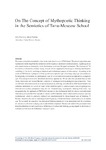Mostrar o rexistro simple do ítem
On the concept of mythopoetic thinking in the Semiotics of Tartu-Moscow School
| dc.contributor.author | Paulus, Ave | es_ES |
| dc.contributor.author | Niitra, Mari | es_ES |
| dc.date.accessioned | 2014-10-02T12:31:58Z | |
| dc.date.available | 2014-10-02T12:31:58Z | |
| dc.date.issued | 2012 | es_ES |
| dc.identifier.citation | Culture of communication / Communication of culture, 2012: 1513-1520. ISBN: 978-84-9749-522-6 | es_ES |
| dc.identifier.isbn | 978-84-9749-522-6 | es_ES |
| dc.identifier.uri | http://hdl.handle.net/2183/13444 | |
| dc.description.abstract | The notion of myth has remarkable place in the analysis of culture of TM School. The present paper discusses mythopoetic modelling from the perspective of the cognitive, social and historical aspects, regarding culture and consciousness as isomorphic, both functioning as at least bilingual mechanism. The theorists of TM School have elaborated a semiotic theory of myth which is opposed to linear-logical thinking and historical modelling of the world, outlining typological and evolutionary aspects of this concept. According to the works of TM School, mythopoetic thinking refers to a specific type of memory, language and worldview. Typologically it represents the paradigmatic type of culture and consciousness as opposed to syntagmatic type. The concept is close to R. Jakobson's theoretical approaches. We can also draw parallels between this binary distinction and Roland Barthes` concepts of ideological and mythological sign production. These two different structures coexist in actual communication, enabling us to talk about different dominants that constitute differences in culture or mind. While different types of communication coexist typologically, from the evolutionary perspective they do not. Characterizing mythopoetic thinking both socio- and ontogenetically, the approach of TM School stresses on the diachronical shift of cultures and individuals from one type to another. For example, J.Lotman and B. Uspenski refer to child consciousness as typically mythological, which is gradually replaced (or complemented) by linear-logical type of thinking. V. Toporov describes the end of cosmological and beginning of historical-linear consciousness in the similar way. To our mind the concept of mythopoetical thinking appears to be an appropriate tool for a typology of cultures as well as for studying culture and child development. Theoretical model of the presented paper describes diachronical and synchronical differences of culture and thinking, giving regards to the theory of evolution as well as to the R.Barthes` concept of myth. | es_ES |
| dc.language.iso | eng | es_ES |
| dc.publisher | Universidade da Coruña | es_ES |
| dc.title | On the concept of mythopoetic thinking in the Semiotics of Tartu-Moscow School | es_ES |
| dc.type | info:eu-repo/semantics/conferenceObject | es_ES |
| dc.rights.access | info:eu-repo/semantics/openAccess | es_ES |






